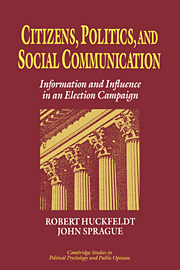Book contents
- Frontmatter
- Contents
- Acknowledgments
- I Democratic politics and social communication
- II Electoral dynamics and social communication
- III Networks, political discussants, and social communication
- 6 Political discussion in an election campaign
- 7 Networks in context: The social flow of political information
- 8 Choice, social structure, and the informational coercion of minorities
- 9 Discussant effects on vote choice: Intimacy, structure, and interdependence
- 10 Gender effects on political discussion: The political networks of men and women
- IV The organizational locus of social communication
- Bibliography
- Index
10 - Gender effects on political discussion: The political networks of men and women
Published online by Cambridge University Press: 22 March 2010
- Frontmatter
- Contents
- Acknowledgments
- I Democratic politics and social communication
- II Electoral dynamics and social communication
- III Networks, political discussants, and social communication
- 6 Political discussion in an election campaign
- 7 Networks in context: The social flow of political information
- 8 Choice, social structure, and the informational coercion of minorities
- 9 Discussant effects on vote choice: Intimacy, structure, and interdependence
- 10 Gender effects on political discussion: The political networks of men and women
- IV The organizational locus of social communication
- Bibliography
- Index
Summary
This chapter examines the political significance of gender by focusing on its consequences for politically relevant social interaction among South Bend respondents during the 1984 presidential election campaign. What is the extent of political discussion between men and women? Between husbands and wives? How do husbands and wives evaluate their spouses as political discussion partners? What are the implications for the transmission and diffusion of political information?
The political significance of gender extends beyond its relevance to political issues and appeals, and thus the role of gender in politics is not fully captured by differences in attitudes and opinions between men and women. Gender is important because it is a primary element in the structure of social interaction, and processes of social interaction are central to political life. Citizens do not formulate their political preferences or exercise their political choices in a social vacuum, but rather in response to a multitude of political messages, many of which are conveyed through personal communication. For these reasons, the political significance of gender is directly related to its potential for structuring social interaction, thereby affecting the transmission and diffusion of political messages. And thus, before turning to an analysis of organization effects on the transmission of political information, this chapter examines gender effects on political discussion.
The conventional tools of political science are not well suited for the study of gender in politics.
- Type
- Chapter
- Information
- Citizens, Politics and Social CommunicationInformation and Influence in an Election Campaign, pp. 191 - 204Publisher: Cambridge University PressPrint publication year: 1995



